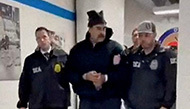Staff Reporter
President Roh Moo-hyun Wednesday expressed cautious optimism with regard to the six-party talks on North Korea’s nuclear weapons program, saying the latest negotiations in Beijing, though no clear agreement was reached, obtained a certain degree of success.
``A joint statement couldn’t be signed due to differences in peaceful nuclear activities, but I believe we’ve made a small achievement,’’ he said at a meeting over lunch with delegates to the six-nation talks.
``It would be hard to affix a seal at once,’’ he said. ``But I’ve heard the atmosphere of the six-party talks has changed a lot.’’
Deputy Foreign Minister Song Min-soon, Seoul’s point man on the nuclear issue, nodded in a show of consent, explaining the details of the talks, a Chong Wa Dae spokesman said.
Minister of Foreign Affairs and Trade Ban Ki-moon is to visit China on Aug. 11-13 and Washington next week to discuss follow-up measures on the North Korean nuclear disarmament talks, aides said.
Despite the cheerful ambiance in Seoul, however, North Korea and the United States traded accusations, putting the blame on the other for the inconclusive talks during the past two weeks.
Three days after the talks, which began a three-week recess Sunday, North Korea argued that it is the U.S. alone that is holding up the nuclear talks, saying Washington must drop its insistence that the North abandon plans for civilian nuclear power plants.
Kim Kye-gwan, the North’s chief negotiator, made no mention of the other four nations in the negotiations and suggested no further flexibility on his part. North Korea’s ``stand on the nuclear issue is very clear,’’ China’s official Xinhua News Agency quoted him as saying Tuesday in the North Korean capital. ``Now it’s up to the U.S. to change its policy.’’
In the U.S., however, President George W. Bush reiterated his stance against the North’s nuclear activities, even for peaceful purposes. In a press conference at his ranch in Crawford, Texas, he cited the difference between the North Korean and the Iranian nuclear issues.
``North Korea is in a different situation,’’ he told reporters after a meeting with his economic advisors. ``The North Koreans didn’t tell the truth when it came to their enrichment programs.’’
In addition to its deceptive past, he also cited another point of difference with Pyongyang, saying it has been offering energy assistance from Seoul. As part of its effort to convince the North to give up its nuclear program, South Korea has offered to directly supply 2 million kilowatts of electricity to the North beginning in 2008.
``The South Koreans have said, `We will build and share power with you,’’’ Bush said, adding the proposal ``seems to make good sense’’ as long as the North gives up their nuclear weapons and ensure full transparency.
Christopher R. Hill, the top U.S. negotiator in the six-party nuclear talks, also insisted that the American position had not changed. The U.S., he said, cannot accept the idea that North Korea could have a peaceful nuclear program.
He said the North took a research reactor allowed under an agreement with the Clinton administration in 1994, and then ejected international inspectors and ``proudly proclaimed it was making bombs’’ from the research reactor. ``So there’s a bit of a problem here.’’
Still, he tried to play down the existing disagreement, saying, ``I would not assume that every difference that emerged at the very end of the talks represents a serious difference or a deal-breaker type difference.’’
Hill said the U.S. could continue contact with North Korea during the three-week recess.
jinryu@koreatimes.co.kr
스마터리빙
more [ 건강]
[ 건강]이제 혈관 건강도 챙기자!
[현대해운]우리 눈에 보이지 않기 때문에 혈관 건강을 챙기는 것은 결코 쉽지 않은데요. 여러분은 혈관 건강을 유지하기 위해 어떤 노력을 하시나요?
 [ 건강]
[ 건강]내 몸이 건강해지는 과일궁합
 [ 라이프]
[ 라이프]벌레야 물럿거라! 천연 해충제 만들기
 [ 건강]
[ 건강]혈압 낮추는데 좋은 식품
[현대해운]혈관 건강은 주로 노화가 진행되면서 지켜야 할 문제라고 인식되어 왔습니다. 최근 생활 패턴과 식생활의 변화로 혈관의 노화 진행이 빨라지고
카테고리 최신기사
- 4기 폐암 치료
- “황희찬 시즌 최고의 퍼포먼스” 극찬, 웨스트햄전 1골·1도움 폭발... 울버햄프턴 ‘EPL 20경기 만에 감격 첫 승’
- “홍명보호 32강은 가지만 16강은 쉽지 않다” 전문가들 전망 [2026 도전 월드컵]
- ‘김민재 직접 모든 러브콜 거절’ 겨울 이적은 없다, 월드컵까진 뮌헨 잔류
- 한국, 북중미 월드컵서 원정 8강 도전… ‘손흥민 라스트댄스’
- ‘메시보다는 손흥민과...’ 美 전역 SON에 푹 빠졌다! 무려 500명 대상 ‘가장 뛰고 싶은 팀’ LAFC 선정
- 미국·캐나다·멕시코, 2026 북중미 월드컵의 모든 것… ‘축구 대제전’ 전 세계 이목 미국으로
사람·사람들
more많이 본 기사
- 베네수엘라 권한대행, 미국에 ‘협력’ 제안… “존중하는 관계로”
- 李대통령 “공급망 예측 어려워져…韓中 경제협력 새항로 찾아야”
- ‘길잃은’ 中 중남미정책…일대일로에 직격탄
- 이혜훈 기획예산처 장관 후보자, 재산 175억7천만원 신고
- 미주한의사총연 송년행사
- 트럼프 “우리가 베네수 맡고 있다…선거前 국가재건이 먼저”
- “올해도 미 성장 지속… S&P 500 두 자릿수↑”
- 중가주 ‘한인 이민사’ 나왔다
- 옐런 전 재무 “공공부채 상환부담 낮추려 통화정책 활용 우려”
- ‘케데헌’, 크리틱스초이스 애니메이션상·주제가상 2관왕
- 세계 곳곳서 ‘美규탄’ 시위…마두로 아들 “거리로 나와달라”
- [美 마두로 축출] 트럼프 말대로 베네수 석유 증산할까…전문가 ‘글쎄’
- 메디케이드 정보 이민국 공유 ‘허용’
- 메스터 전 연은 총재 “관세영향 제외해도 인플레 위험 여전”
- 베네수엘라, 세계 최대 매장량이라는데…국제유가도 영향받나
- 가주, 개인정보 보호법 ‘초강수’
- [신년 집중기획/2026 새해 이렇게 바뀐다] 이민 제도 5대 변화… 영주권자까지도 입국시 안면인식 생체정보 수집
- 美 ‘유령 특수부대’ 델타포스
- 현대차·기아·제네시스… 2025년 판매 역대 최다
- [CES 2026] “CES는 미중 긴장완화 ‘가교’…스위스 같은 중립지대 지향”
- ‘국민 배우’ 안성기 별세…69년 연기 인생 마침표
- 故김영인 누구?..故송도순 이어 별세, 슬픔에 빠진 방송계
- 아이유♥변우석·지성·신하균·유연석.. ‘2026 MBC 연기대상’ 벌써 치열하다
- 임재범, 은퇴 발표 “박수칠 때 떠나겠다”
- [美 마두로 축출] 미 곳곳서 반전시… 1
- 코미디부터 예술영화까지… ‘천의 얼굴’로 스크린 누빈 안성기
- [한인 은행·업체 시무식 화보] “붉은 말 기운받고 한인 경제 도약에 기여하자”
- 美, 베네수 부통령에 압박 “마두로와 다른 선택하길”
- [美 마두로 축출] 뉴욕 구치소 수감된 마두로… “좋은 밤이에요” 인사도
- 이부진 호텔신라 사장 NBA 중계화면에…아들과 함께 미국서 휴가
- [CES 2026] 우유 꺼내고 수건 개는 로봇…LG ‘가사 해방’ 속도
- [CES 2026] 6억달러 새단장한 우아한 전시장…내부엔 지게차 동원 개막준비
- 美 경제석학 “韓 원화가치 매우 저평가…향후 회복할 것”
- [美 마두로 축출] 트럼프 ‘서반구 패권’ 구상 본격화하나…중남미 긴장 고조
- [美 마두로 축출] 마두로 베네수엘라 대통령, 5일 법정 첫 출석
- [美 마두로 축출] 트럼프, 두번째 중대 군사작전…北이 받을 메시지는
- 젤렌스키 “이달 내로 종전안 놓고 美 정상회의 희망”
- “황희찬 시즌 최고의 퍼포먼스” 극찬, 웨스트햄전 1골·1도움 폭발... 울버햄프턴 ‘EPL 20경기 만에 감격 첫 승’
- [美 마두로 축출] 갈라진 지구촌…쏟… 1
- 美, 직접통치아닌 압박통한 정책개입 가닥… “함포외교”
- 李대통령 “中, 한반도 평화 파트너…… 2
- ‘연프 중독’ 고준희, 눈 성형 고백에 풍자 “과연 눈만 했을까?” 의심
- 영종도 인천공항 잇는 3번째 다리 내일 개통…요금 2천원
- 美, 베네수 전격공격 마두로 축출…트럼프 “공격성공, 체포”
- 김병기, 경찰에 줄고발… ‘아들 취업… 1
- [美 마두로 축출] 루비오 국무장관, 베네수 부통령에 “마두로와 다른 선택하길”
- [美 마두로 축출] 트럼프 “베네수엘라 부통령이 잘하면 미군 주둔 안해”
- 20kg 빼고 아이돌 외모 되찾더니..강남, 기안84와 북극 마라톤 도전
- ‘에릭♥’ 나혜미, 두 아들과 일상 공개..짱구 볼살+붕어빵 눈매 “우리 강아지들”
- ‘밀라노행 확실시’ 피겨 차준환, 올림픽 2차 선발전 쇼트 1위... 프리 스케이팅 예정
1/5지식톡

-
 미 육군 사관학교 West Poin…
0
미 육군 사관학교 West Poin…
0https://youtu.be/SxD8cEhNV6Q연락처:wpkapca@gmail.comJohn Choi: 714-716-6414West Point 합격증을 받으셨나요?미 육군사관학교 West Point 학부모 모…
-
 ☝️해외에서도 가능한 한국어 선생님…
0
☝️해외에서도 가능한 한국어 선생님…
0이 영상 하나면 충분합니다!♥️상담신청문의♥️☝️ 문의 폭주로 '선착순 상담'만 진행합니다.☎️ : 02-6213-9094✨카카오톡ID : @GOODEDU77 (@골뱅이 꼭 붙여주셔야합니다…
-
 테슬라 자동차 시트커버 장착
0
테슬라 자동차 시트커버 장착
0테슬라 시트커버, 사놓고 아직 못 씌우셨죠?장착이 생각보다 쉽지 않습니다.20년 경력 전문가에게 맡기세요 — 깔끔하고 딱 맞게 장착해드립니다!장착비용:앞좌석: $40뒷좌석: $60앞·뒷좌석 …
-
 식당용 부탄가스
0
식당용 부탄가스
0식당용 부탄가스 홀세일 합니다 로스앤젤레스 다운타운 픽업 가능 안녕 하세요?강아지 & 고양이 모든 애완동물 / 반려동물 식품 & 모든 애완동물/반려동물 관련 제품들 전문적으로 홀세일/취급하는 회사 입니다 100% …
-
 ACSL 국제 컴퓨터 과학 대회, …
0
ACSL 국제 컴퓨터 과학 대회, …
0웹사이트 : www.eduspot.co.kr 카카오톡 상담하기 : https://pf.kakao.com/_BEQWxb블로그 : https://blog.naver.com/eduspotmain안녕하세요, 에듀스팟입니다…
케이타운 1번가
오피니언
 손영아 문화 칼럼니스트 / YASMA7 대표
손영아 문화 칼럼니스트 / YASMA7 대표 [손영아의 문화산책] ‘슈만의 연가’… 170년 전 멈춘 시간, 끝나지 않은 사랑
 김재천 서강대 국제대학원 교수
김재천 서강대 국제대학원 교수 [김재천 칼럼] 2026년, 미·중 대타협은 가능할까
 조지 F·윌 워싱턴포스트 칼럼니스트
조지 F·윌 워싱턴포스트 칼럼니스트 [조지 F. 윌 칼럼] AI 투자 붐이 걱정된다면?… 역사적 맥락을 보라
 이희숙 시인·수필가
이희숙 시인·수필가 [금요단상] 차가운 길, 이불 한 장의 온기
 한영일 / 서울경제 논설위원
한영일 / 서울경제 논설위원 [만화경] 33년만에 퇴역하는 장보고함

[왈가 왈부] 이혜훈 ‘정말 널 죽였으면’ 폭언, 장관직 수행 가능할까요
 정숙희 논설위원
정숙희 논설위원샴페인, 마지막 날과 첫날을 위하여
 조지 F·윌 워싱턴포스트 칼럼니스트
조지 F·윌 워싱턴포스트 칼럼니스트 [조지 F. 윌 칼럼] 저무는 2025년에 안도의 한숨
 김동찬 시민참여센터 대표
김동찬 시민참여센터 대표 [미국은 지금] 책임 있는 자본 없으면 커뮤니티 미래도 없다
1/3지사별 뉴스

뉴욕시 첫 무슬림 시장 맘다니 취임
미국 최대도시이자 경제 수도로 꼽히는 뉴욕시의 첫 무슬림·남아시아계 시장이자 스스로를 민주사회주의자라고 부르는 조란 맘다니 신임 뉴욕시장이 새…
뉴욕시민 기대수명 82.6세⋯팬데믹 이전 회복

건국 250주년 워싱턴 모뉴먼트 라잇쇼
워싱턴 DC 내셔널 몰 중심에 위치한 워싱턴 모뉴먼트(Washington Monument)가 화려한 불빛으로 장식됐다. 지난 31일 새해 카운…
“소확행<작지만 확실한 행복> 즐겨요”

[美 마두로 축출] 트럼프 “베네수엘라 부통령이 잘하면 미군 주둔 안해”
도널드 트럼프 대통령은 베네수엘라 측이 미국이 바라는 대로 행동하는 한 미군이 베네수엘라에 주둔하지 않을 것이라고 말했다고 뉴욕포스트가 3일 …
중부 캘리포니아 ‘한인 이민사’ 나왔다

오늘 하루 이 창 열지 않음 닫기 




















































.png)


댓글 안에 당신의 성숙함도 담아 주세요.
'오늘의 한마디'는 기사에 대하여 자신의 생각을 말하고 남의 생각을 들으며 서로 다양한 의견을 나누는 공간입니다. 그러나 간혹 불건전한 내용을 올리시는 분들이 계셔서 건전한 인터넷문화 정착을 위해 아래와 같은 운영원칙을 적용합니다.
자체 모니터링을 통해 아래에 해당하는 내용이 포함된 댓글이 발견되면 예고없이 삭제 조치를 하겠습니다.
불건전한 댓글을 올리거나, 이름에 비속어 및 상대방의 불쾌감을 주는 단어를 사용, 유명인 또는 특정 일반인을 사칭하는 경우 이용에 대한 차단 제재를 받을 수 있습니다. 차단될 경우, 일주일간 댓글을 달수 없게 됩니다.
명예훼손, 개인정보 유출, 욕설 등 법률에 위반되는 댓글은 관계 법령에 의거 민형사상 처벌을 받을 수 있으니 이용에 주의를 부탁드립니다.
Close
x